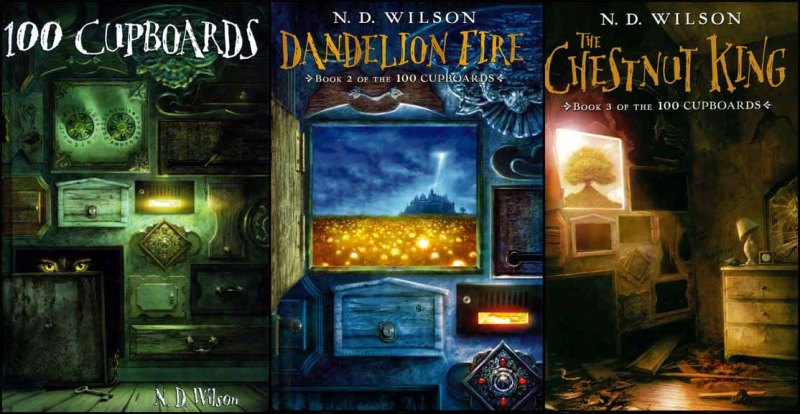This has been my favorite book for a very long time. Sadly, to be honest, I am unsure if I have ever heard it brought up by someone else. It seems to be an unknown classic, a book incredibly well written with a beautiful, imaginative world and a strong storyline. And yet… no one has heard of it. Written by the great N. D. Wilson, it covers some of the topics most dear to me: baseball, rural America, magical worlds, families reuniting, and even the appearance of one of my favorite flowers, the dandelion.
100 Cupboards is not just a shallow children’s fantasy. It covers some intense topics that have life-changing meanings. There are a few big ones that are incredibly beneficial to consider. These core themes include weakness, failure, and fate.
Weakness
The main character is a twelve-year-old boy named Henry York. He is shipped off to his aunt and uncle’s house in the middle of Kansas after the kidnapping of his rich traveling parents. Having been sheltered and kept emotionally distant from his parents his entire life, he receives quite an education in this small, rural town. He also discovers a wall of cupboards, each of which leads to an entirely different world. Through the series, he finds out that he was originally from one of these worlds and had been separated from his true family. He uncovers that he has powers tied to the plant source the dandelions.
What is unique about this protagonist is the various weaknesses he shows. From the very beginning, he is portrayed as a boy scared of baseballs and not buckling seatbelts. Even drinking soda is a new concept for him. Throughout the books, he makes a habit of throwing up when scared or overwhelmed. He feels fear very easily. While he does administer the final push that defeats the evil witch trying to destroy their world, he is often not possessive of the skills necessary to change things in a significant way. He is not made to be the hero who solves all the problems. He is weak. He is human.
Too often, protagonists are shown to be some form of superhero. They can never be in the wrong, always possess the skills to defeat the bad guys, and typically hold an unrealistic amount of power for someone of their age or standing. Henry, however, is portrayed with his weaknesses as well as his strengths. He is shown to be exactly what you could expect. A brave but inexperienced and sometimes nervous twelve-year-old. Because of this, we get to see someone who uses their weaknesses to strengthen themselves. It begs the suggestion that sometimes being humble or lacking in perfection holds more value than being the strong, stoic champion. It adds so much to watching him grow and develop when you understand the obstacles, even in himself, that he has to overcome.
Failure
Throughout the series, Henry and his family and friends are attempting to stop the witch queen Nimiane from sucking the life out of the world they know and love. She calls on her evil powers to create sick, unnatural henchmen and gathers support among those with dark hearts hidden in the cracks and crevices of their world. The books are colored with failures they acquire in trying to stop her. Even in the very beginning, it becomes apparent that Henry’s biological father has been trapped for several years after failing to combat the witch.
Henry and the other characters stand up against the witch and fall again. Even the plant source that his powers are associated with is noteworthy because of its capacity to fail.

Dandelions have a fiery, short-lived nature. They die easily and quickly but no matter how many you kill, more seem to rise up. They can either be a weed and a nuisance, or they can be a beautiful flower, it is up to the beholder.
Henry is said to have the same strength. He is shown to be weeded or bulldozed time and time again but to always rise more courageous and determined than before.
We live in a world that is based on accomplishments. It does not matter why you did something or even what you tried to do. It is fully based on the outcome that your attempts bring. It is an incredibly powerful message to realize that the intention that is behind your actions means just as much, if not more, than the actions themselves. Doing good for the purpose of bad is not good. It is a hard thing to try even though you know you will fail. But sometimes, it is an incredibly important thing.
“Sometimes standing against evil is more important than defeating it. The greatest heroes stand because it is right to do so, not because they believe they will walk away with their lives. Such selfless courage is a victory in itself.”
Book 2, Dandelion Fire
Fate
There are themes of fate throughout the book series. Henry already has some very pointed things in his favor. The fact that he even has his powers is very well orchestrated. And that he finds his way back to the other worlds he was born in also testifies to something more than simple luck. He seems to be pitted against this witch, she is his decided enemy.
Both sides try to suggest that his fate is to be with them. The witch’s henchmen try to recruit him several times. They seem to think that he is supposed to be on their side. His father and uncles would disagree, saying he had been given these important abilities to defeat the witch. Lies and “prophecies” color many of his interactions with other characters. And yet, throughout the books, he stays consistent wholeheartedly with his principles and beliefs about what is right. Even though he is a young, impressionable boy, he is not swayed by the many voices he hears.

We hear so many voices nowadays arguing for our attention. It is easy to even unknowingly give bad ideas room to fester and grow. We can find ourselves so slowly it is almost unnoticeable drifting from what we once thought was right and true. We should, however, always prioritize the truth, as Henry demonstrates. Being clear about what you believe and think about yourself is the best way to combat this. Choose what you will not question and do not stray from the principles you decide on. Being unmoved in the face of value will have much more power than any physical or mental inadequacies you feel you possess.
100 Cupboards supports some powerful and effective truths. The way it embraces weakness, failure, and defiance of fate is something that we can all reap from. And the way that N. D. Wilson outlines these truths with swaying metaphors and language brings fresh light to these concepts. This book is a special one, but the lessons it teaches are even more important. Constantly facing subtle lies dressed like truth, we need these reminders more than ever. As the book itself says, “It’s the dull knife that cuts you.” Let us keep the dull knives, those secret destructive fibs, where we can see them.
